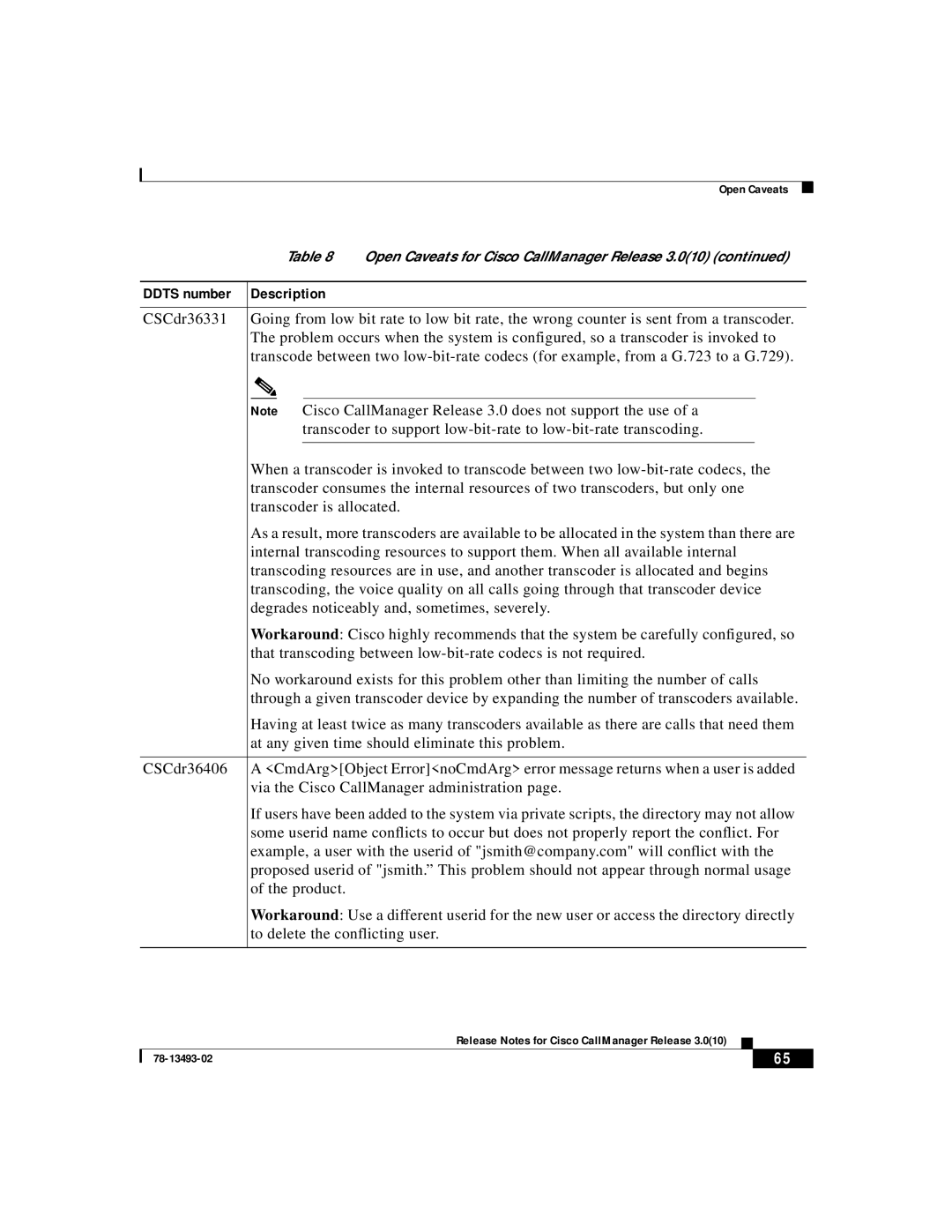|
|
|
|
|
|
|
|
|
|
|
|
|
|
|
| Open Caveats |
| ||
|
|
|
| Table 8 | Open Caveats for Cisco CallManager Release 3.0(10) (continued) |
| |||
|
|
|
|
|
| ||||
DDTS number |
| Description |
|
|
|
| |||
|
|
|
| ||||||
CSCdr36331 |
| Going from low bit rate to low bit rate, the wrong counter is sent from a transcoder. |
| ||||||
|
| The problem occurs when the system is configured, so a transcoder is invoked to |
| ||||||
|
| transcode between two |
| ||||||
|
|
|
|
|
|
|
|
| |
|
| Note |
| Cisco CallManager Release 3.0 does not support the use of a |
| ||||
|
|
|
|
| transcoder to support |
| |||
|
|
|
|
|
| ||||
|
| When a transcoder is invoked to transcode between two |
| ||||||
|
| transcoder consumes the internal resources of two transcoders, but only one |
| ||||||
|
| transcoder is allocated. |
| ||||||
|
| As a result, more transcoders are available to be allocated in the system than there are |
| ||||||
|
| internal transcoding resources to support them. When all available internal |
| ||||||
|
| transcoding resources are in use, and another transcoder is allocated and begins |
| ||||||
|
| transcoding, the voice quality on all calls going through that transcoder device |
| ||||||
|
| degrades noticeably and, sometimes, severely. |
| ||||||
|
| Workaround: Cisco highly recommends that the system be carefully configured, so |
| ||||||
|
| that transcoding between |
| ||||||
|
| No workaround exists for this problem other than limiting the number of calls |
| ||||||
|
| through a given transcoder device by expanding the number of transcoders available. |
| ||||||
|
| Having at least twice as many transcoders available as there are calls that need them |
| ||||||
|
| at any given time should eliminate this problem. |
| ||||||
|
|
|
| ||||||
CSCdr36406 |
| A <CmdArg>[Object Error]<noCmdArg> error message returns when a user is added |
| ||||||
|
| via the Cisco CallManager administration page. |
| ||||||
|
| If users have been added to the system via private scripts, the directory may not allow |
| ||||||
|
| some userid name conflicts to occur but does not properly report the conflict. For |
| ||||||
|
| example, a user with the userid of "jsmith@company.com" will conflict with the |
| ||||||
|
| proposed userid of "jsmith.” This problem should not appear through normal usage |
| ||||||
|
| of the product. |
|
|
|
| |||
|
| Workaround: Use a different userid for the new user or access the directory directly |
| ||||||
|
| to delete the conflicting user. |
| ||||||
|
|
|
|
|
|
|
|
|
|
|
| Release Notes for Cisco CallManager Release 3.0(10) |
|
|
|
|
| ||
|
|
| 65 | |
|
|
|
